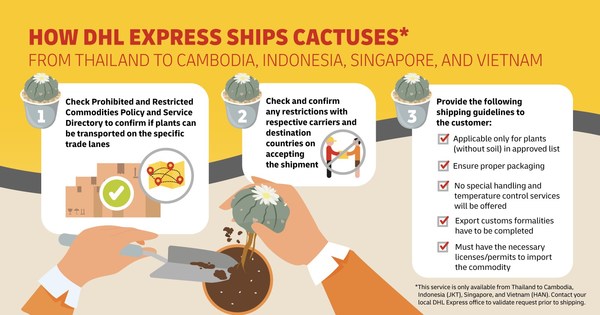DHL Express Thailand launches next-day cactus export service to Singapore, Indonesia, Vietnam and Cambodia

Cactus Export service helps local business owners meet growing overseas demand,with next-day delivery excluding customs inspection and clearance process.
CITES Permit (Convention of International Trade in Endangered Species of wild fauna and flora) and Phytosanitary Certification are required by the customs authority,and import requirements at different destination countries vary.
DHL's cross border and customs expertise makes it easy for local sellers to export cactuses from Thailand to four destination countries in Southeast Asia
BANGKOK,July 13,2021 -- DHL Express Thailand has introduced Cactus Export Service to provide next-day delivery of delicate plants like cactuses from Thailand to Singapore,Indonesia,Vietnam and Cambodia. Cactuses have become increasingly popular in Southeast Asia. This new service will allow local business owners to capture the opportunities of this increasing demand and expand their reach across the region.
DHL Express provides cactus business owners with access to direct routes from Bangkok Hub and Gateway to the four country destinations. Full tracking visibility is enabled across the entire supply chain and supported by DHL Express' own fleet of planes,ground transport and logistics facilities.
"Regular conversations with our customers in order to review our services and identify areas where we could improve is important to us. We are constantly looking at ways to better serve our customers,and to be the platform of choice. By expanding our capabilities to now include cactus delivery not only opens doors to new possibilities and cross-border opportunities for our customers,it also shows our versatility and commitment to meet their needs," said Ken Lee,CEO,DHL Express Asia Pacific.
According to the Global Succulent & Cactus Plants Market Report 2020,the Succulent & Cactus Plants Market will register 16.80% CAGR over the next six years to 2027[1]. The four destinations accommodate international trade amid the COVID-19 gardening boom. Many cactus species are highly localized and tend to be slow-growing. These features make cactus particularly attractive to collectors interested in exclusivity.
"The pandemic has accelerated the adoption of lifestyle e-commerce. With our cactus export service,cactus business owners can take advantage of our global network and expertise to get their products quickly delivered. This launch reflects our commitment to Thai SMEs,the sector most affected by the pandemic. We continue exploring alternative services for them,working closely with our operations to establish compliant processes that address the restrictions for cactus shipping to accommodate them," said Herbert Vongpusanachai,Managing Director at DHL Express Thailand & Head of Indochina.
Cactuses adapt well to the intense heat and survive the warm and dry conditions of a centrally heated home.These succulents are also perfect for the less green-fingered,as they need only moderate watering and minimal care. The cactus business has become one of the hottest during the pandemic,with shops struggling to keep some species in stock.

DHL Express’ clear processes and guidelines to ship cactuses
"With home gardening surging in popularity during the lockdown,I have been growingcactuses at home and this propelled me to take the plunge into entrepreneurship. I started the cross-border business because the market is much bigger and I use DHL Express for delivery," said Athiwat Chakpan,the owner of Cactus Inter. "Although drought-resistant cactuses can survive without soil for months,having them packed with limited airflow during transit may cause the cactus to die quickly and lead to fragmented quality. Using a reliable express service provider is essential to building trust,especially with my return customers. Being able to track and trace their products en route,and receive their cactus plants safely and on time,is a great customer experience that we always aim to deliver."
To deliver cactuses to Singapore,Vietnam and Cambodia with DHL Express,a CITES Permit (Convention of International Trade in Endangered Species of wild fauna and flora) is required by the customs authority,together with Phytosanitary Certification to certify that cactus is free from pests and aligns with conditions of the destination country. The recipient is advised to contact the ministry or relevant agency before the goods are delivered to prepare the import documents and facilitate prompt delivery.
Contact our Customer Service at 02-345-5000 (24 hours) for shipment booking instructions of DHL Express Cactus Export service or read an interview of how business is spiking for the Thai cactus seller amid a Covid-19 gardenging boom at https://lot.dhl.com/business-is-spiking-for-this-thai-cactus-seller-amid-a-covid-19-gardening-boom/
[1] Global Succulent & Cactus Plants Market Report 2021
– End –
Website: https://www.mydhl.express.dhl
Follow us at: https://www.facebook.com/DHLExpressTH
DHL – Thelogistics company for the world
DHLis the leading global brand in the logistics industry. Our DHL divisions offer an unrivalled portfolio of logistics services ranging from national and international parcel delivery,e-commerce shipping and fulfilment solutions,international express,road,air and ocean transport to industrial supply chain management. With about 400,000 employees in more than 220 countries and territories worldwide,DHL connects people and businesses securely and reliably,enabling global sustainable trade flows. With specialized solutions for growth markets and industries including technology,life sciences and healthcare,engineering,manufacturing & energy,auto-mobility and retail,DHL is decisively positioned as "The logistics company for the world".
DHL is part of Deutsche Post DHL Group. The Group generated revenues of more than 66 billion euros in 2020. With sustainable business practices and a commitment to society and the environment,the Group makes a positive contribution to the world. Deutsche Post DHL Group aims to achieve zero-emissions logistics by 2050.